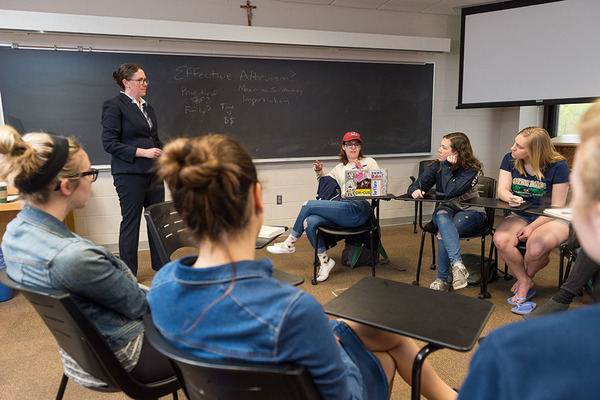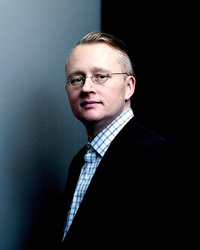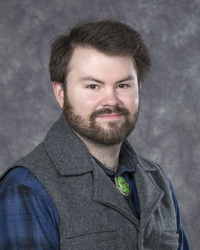
The Notre Dame Institute for Advanced Study (NDIAS) has announced the creation of a teaching lab program to provide fellowships and resources to faculty seeking to build the next generation of interdisciplinary courses at Notre Dame.
Established with support from Paul Bonitatibus (‘71), the NDIAS Teaching Lab will provide assistance to instructional teams of 2-3 members who are designing Notre Dame courses that fulfill an unmet student need, serve at least 60 students per year, and sustainably integrate into college curricula. A further priority of the lab will be to support courses whose learning goals target the moral formation of students by helping them address questions of value and meaning in their lives and the lives of others.
“We are grateful to Paul and his family for their generous support of the NDIAS Teaching Lab,” said Meghan Sullivan, director of the NDIAS and the Wilsey Family College Professor of Philosophy. “The world is in a period of unprecedented change in its cultural vision for what it means to educate university students. At Notre Dame, we aspire to produce generations of students who have the confidence and skill to reason through the moral problems of our ever-changing world. The NDIAS Teaching Lab will serve as an incubator for bold new courses and help Notre Dame further establish itself as a thought-leader in pedagogy.”

Roy Scranton, Associate Professor of English and Director of the Environmental Humanities Initiative at Notre Dame, will be the NDIAS’s inaugural Teaching Lab Fellow during the 2021-2022 academic year. Scranton will design an introductory Environmental Humanities course and regularly participate in the NDIAS’s faculty programming, including its presentation workshops and writing retreats designed to help faculty communicate research ideas to broad audiences.
“The NDIAS Teaching Lab is an opportunity to think deeply about how we can better prepare Notre Dame students for leadership roles in a rapidly changing world,” said Scranton. “As our students grapple with questions such as how to make a just transition to a more sustainable and resilient society, how to communicate the scope and urgency of our global ecological crisis, what are the moral duties in caring for creation, and what it means to be human when humanity has become a geological force, we have an obligation as educators to help them address such questions with discernment and a concern for the common good. I’m grateful to the NDIAS for giving me the chance to develop a course that will bring science, literature, and questions of value and meaning together in a practical example of integral ecology.”

Scranton will be joined by Ross Jensen, who is completing his Ph.D. in Notre Dame’s Department of Philosophy and will serve as a 2021-2022 postdoctoral fellow at the NDIAS through Notre Dame’s 5+1 Postdoctoral Fellowship Program. Jensen will aid Scranton in the creation of his course and assist the NDIAS in other capacities.
The Teaching Lab builds on the success of the God and the Good Life program in Notre Dame’s Department of Philosophy, which uses interactive readings, dialogue groups, debates, and a team of faculty, graduate, and undergraduate instructors to introduce students to philosophy and help them wrestle with big questions about how to live and what makes life meaningful. Sullivan helped launch the course in 2016, and it now enrolls more than 600 students each semester.
“Roy’s proposal to expand and redesign his Environmental Humanities course was a perfect inaugural project for the Lab,” Sullivan said. “With his collaborators and Ross’s postdoctoral support, he is building a course that will help generations of Notre Dame students think about our obligations to our common home, tying together resources from literature, philosophy, Earth sciences, and the Catholic intellectual tradition. We hope it will be a model for the next round of proposals from our colleagues and will make Notre Dame that much more exciting for students passionate about these issues.”
The NDIAS convenes an interdisciplinary group of faculty fellows, top doctoral candidates, and undergraduate scholars to study questions that require a joint focus, benefit from sustained research and discussion, and advance our understanding of core issues that affect our ability to lead valuable, meaningful lives. The NDIAS’s organizing research theme for 2021-2022 will be Resilience. To learn more, please visit ndias.nd.edu.
Contact:
Maria Di Pasquale / Associate Director
Notre Dame Institute for Advanced Study / University of Notre Dame
mdipasqu@nd.edu / 574.631.3770
About Notre Dame Research:
The University of Notre Dame is a private research and teaching university inspired by its Catholic mission. Located in South Bend, Indiana, its researchers are advancing human understanding through research, scholarship, education, and creative endeavor in order to be a repository for knowledge and a powerful means for doing good in the world. For more information, please visit research.nd.edu or @UNDResearch.
Originally published by at ndias.nd.edu on May 21, 2021.